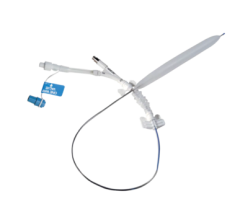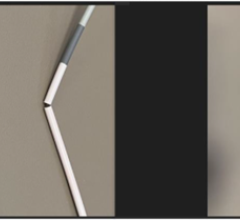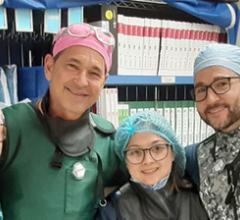
AngioScore Completes Enrollment in Drug-Coated Scoring Balloon Study
July 23, 2013 — AngioScore Inc. announced the completion of enrollment in the Drug-Coated AngioSculpt Scoring Balloon Catheter First-in-Human (FIH) Study (PATENT-C). AngioScore anticipates that preliminary data from this study will be available for presentation at the Transcatheter Cardiovascular Therapeutics (TCT) conference to be held this fall in San Francisco.
This FIH trial of a novel drug-coated scoring balloon enrolled 61 patients with coronary in-stent restenosis (ISR) at five renowned international sites, four in Germany and one in Brazil. The study is led by Bruno Scheller, M.D., professor of interventional cardiology at Saarland University Hospital, Homburg, Germany, who along with Professor Ulrich Speck of the Charite Hospital in Berlin, is one of the preeminent pioneers in the rapidly developing field of drug-coated balloons for the treatment of coronary and peripheral artery disease. “The development of a Drug-Coated AngioSculpt represents a potential major advance in the percutaneous treatment of endovascular disease,” said Scheller. “I am honored to lead this important study and to collaborate with such an internationally prominent interventional cardiologist as Professor Alexandre Abizaid and his team at Dante Pazzanese Institute of Cardiology in Sao Paulo, Brazil.”
“The AngioSculpt Scoring Balloon Catheter represents a significant advance in the treatment of challenging coronary and peripheral lesions. AngioScore’s PMA clinical trial and other studies demonstrated the ability of the AngioSculpt to achieve more predictable luminal expansion, avoid slippage or geographic miss and result in a low rate of dissection. We believe these features may be particularly valuable in the field of drug-coated balloons by ensuring more precise delivery of the anti-proliferative drug and potentially obviating the need to deploy a stent in a significant proportion of lesions,” said Gary Gershony, M.D., co-founder and chief medical officer of AngioScore. “Extensive pre-clinical studies performed by Speck and Scheller have preliminarily demonstrated the safety of a drug-coated AngioSculpt and its potential ability to have a profound effect on preventing restenosis. These studies have laid the groundwork for this FIH clinical trial.”
The drug-coated AngioSculpt FIH study was designed as a randomized controlled trial comparing the recently developed drug-coated AngioSculpt with the commercially available uncoated version of the AngioSculpt in patients presenting with significant restenosis in a previously implanted coronary bare metal stent. Patients will undergo follow-up coronary angiography at six months to compare the rate of recurrent restenosis and late lumen loss (LLL) in both treatment arms. Additional study endpoints include the rate of major adverse cardiovascular events (MACE), clinically driven target lesion revascularization (TLR) and stent thrombosis for up to two years following the index procedure. All angiograms will be analyzed by an independent core laboratory at the Cardiovascular Research Foundation in New York, N.Y.
More than 3 million coronary and peripheral angioplasty procedures are performed annually worldwide. A majority of these lesions are treated with permanent stents that often require concomitant treatment with a prolonged course of dual anti-platelet therapy to avoid the potentially life-threatening complication of stent thrombosis, adding significantly to the procedural costs and to the long-term risk of serious bleeding complications. Additionally, there are important lesion subsets that may not be suitable for stenting including side-branch vessels of bifurcations, smaller-caliber vessels, restenosed stents and certain peripheral vessels. A drug-coated AngioSculpt may allow a shortened course of dual anti-platelet therapy and has the potential to transform the treatment of many patients presenting with these challenging lesions.
The AngioSculpt Scoring Balloon Catheters represent the next generation in angioplasty catheters for both coronary and peripheral artery disease. The AngioSculpt catheters provide the versatility and effectiveness of a new technology together with the simplicity and deliverability of traditional high-performance balloon catheters.
AngioSculpt catheters have now been used in more than 250,000 procedures worldwide and have achieved an outstanding safety and performance record in the treatment of both coronary and peripheral artery disease.
The Drug-Coated AngioSculpt Scoring Balloon Catheter is an investigational device, limited by applicable law to investigational use and not available for sale.
For more information: www.angioscore.com


 June 13, 2024
June 13, 2024 









